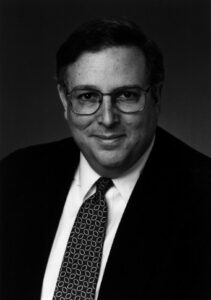Florida health czar Doug Cook said he was “sick for a week” after he learned two of his HMO regulators had accepted more than $90,000 in consulting fees from two Medicaid health plans.
“Common sense would indicate this is extremely improper,” said Cook, director of the Agency for Health Care Administration. “Ninety-nine point nine percent of our employees would not even consider this. Unfortunately, these two women did.”

The health agency fired Elizabeth Page Anderson-McGivern and Rosemary Arbuckle-Anderman last spring for violating restrictions on moonlighting within the health care industry. Both workers were program analysts, helping decide which HMOs got Medicaid contracts. The state alleges they took money from HMOs in exchange for preparing applications for Medicaid contracts.
A week after the firings, prosecutors in Tallahassee took the unusual step of charging the women, both of whom have law degrees, with official misconduct, a felony. Both have denied wrongdoing.
Whatever the outcome in court, the cases reflect some of the ethical and legal dilemmas emerging as more than 40 states turn to managed care to save money on Medicaid, the nation’s $178-billion-a-year health care plan for the poor.
“There’s a huge amount of dollars out there,” said Steven Wiggs, director of the Medicaid Fraud Unit at the Arizona Attorney General’s Office in Phoenix. “It’s a volatile mix in terms of the potential for corruption and I’m not sure there are enough safeguards.”
Under managed care, state regulators award HMOs a contract for medical services — often for years at a time — that can be worth millions of dollars to successful bidders.
Florida’s health agency employs about 60 regulators and other workers who oversee 18 Medicaid HMOs. Employees may investigate complaints about the quality of medical care and help decide if health plans have adequate medical staff and finances to qualify for contracts.
For managed care to work well for the Medicaid program, experts say, state regulators must even-handedly impose performance standards and be free to discipline, even bar, HMOs that give poor-quality medicine, or run inefficiently.
But no national standards exist to guide states on how to oversee HMOs and to protect the integrity of the contract-approval process. In May, for example, the General Accounting Office, the auditing arm of Congress, found that state HMO controls need to be improved. Medicaid treats more than 30 million Americans and is so costly it consumes 20 percent of state budgets. Florida prosecutors say some conflicts are apparent. They assert that Anderson-McGivern and Arbuckle-Anderman signed forms stating they had not done any outside work that was a conflict with their duties regulating state HMOs.
Yet both had negotiated contracts that paid them $92,000 to assist two Florida HMOs prepare the extensive state applications. In one case, Arbuckle-Anderman helped prepare an HMO’s application for a Florida Medicaid contract. In the other case, both employees helped an HMO complete paperwork for a permit to do business in New Jersey.
Because they signed the state forms, both were charged with official misconduct, falsification of a record with the corrupt “intent” to obtain a benefit.
Steve Andrews, a Tallahassee lawyer representing Anderson-McGivern, said his client is fighting the charges. He denied any corrupt intent. Arbuckle-Anderson’s attorney said he would advise his client not to comment. No trial date has been set.
But the cases have helped spark debate over what types of financial dealings with HMOs should be out of bounds for Medicaid regulators, and what restrictions should be placed on those who leave government for jobs in the HMO industry.
“It creates a poor image when people responsible for regulating move freely from one entity to another,” said Florida health agency general counsel Jerome Hoffman. “There needs to be some further attention paid to this.”
In recent years, at least 10 states, including Florida, Illinois and Colorado, and the federal government, have seen Medicaid directors or top program officials accept executive-level jobs at HMOs or other health care firms that have state Medicaid contracts.
“States have a terrible time retaining staff. HMOs gobble them up and pay them more,” said Michael Bailit, former assistant commissioner of the Massachusetts Division of Medical Assistance. Bailit left his state job in January to form a consulting firm that advises states on Medicaid matters.
The departure of key Medicaid directors for jobs in the booming HMO market has proven controversial in several states.
Colorado legislators, for instance, demanded an ethics review after Medicaid Director David West left to head a start-up Medicaid HMO, records show. West was cleared in April 1996 because he had been removed from all discussions involving managed care when he advised his superiors he was taking the HMO job. State officials said West also had no contact with former co-workers for six months after his departure, records show.
West, executive director of Colorado Access HMO in Denver, the state’s largest Medicaid plan, said he “strictly adhered” to state ethics codes.
But a “revolving door” in which former regulators wind up working for HMOs is a troubling sign, said Arizona official Wiggs. Taxpayers and Medicaid patients need assurances that contractors won’t get lenient treatment from regulators hopeful of one day landing a better-paying job with private industry, he said. Such trends could cost taxpayers by discouraging regulators from demanding that HMOS offer the states the best rates and jeopardize patient care by allowing poor quality plans to evade punishment.
“Lax regulation is an invitation to fraud,” added Susan Sherry, program director for Community Catalysts, a Boston consumer advocacy group. “It’s not in anybody’s interest to have poor oversight.”
The case of two dozen state and HMO employees in Maryland, all convicted of bribery charges in 1995, shows how problems can develop when HMOs reach out and grab former state Medicaid workers or have financial ties to them, said Maryland Assistant Attorney General Carolyn J. McElroy.
In the scheme, ex-welfare case workers hired by HMOs would contact their former co-workers to learn when a family had become eligible for Medicaid, supposedly confidential information. Instead, state workers sold the names and addresses, so HMO marketers could rush over and sign them up.
“When they (HMOs) hired these people they knew they had more access than anyone else,” McElroy said.
While at least 30 states restrict employment of former regulators, these laws often are laden with exceptions, or have been interpreted in ways that favor former employees, a survey of states shows.
For example, Florida officials in 1995 sought ethics reviews of six people who left the state health agency for positions with Medicaid HMOs. Officials cited a state law requiring employees to wait two years before joining firms with which they “participated personally and substantially.”
The Florida Commission on Ethics disagreed. It ruled in one case that an ex-employee had not been “sufficiently involved” with the HMOs to violate the law. The case involved a program analyst who accepted a job with an HMO a few months after she had helped approve the HMO’s application for a Medicaid contract. Given the outcome, and a similar commission ruling in another of the six ethics cases, health agency officials dropped the matter, according to general counsel Hoffman.
Similarly, ethics enforcement in New York was all but nixed in late 1995, when the state’s supreme court ruled that former state employees were off the hook once they left office, even if they resigned under investigation.
“They can do what they want, and if they get caught they just quit,” said Walter Ayres, spokesman for the New York State Ethics Commission in Albany. The commission dropped 14 ethics reviews after the ruling.
In light of these decisions, Florida official Hoffman said the federal Health Care Financing Administration, which shares oversight and financing of Medicaid with the states, should “step in and set some common standards to make the rules more consistent.”
The federal health agency does not bar its employees from leaving to join private firms they worked closely with. It does, however, forbid ex-employees from taking any action on behalf of a new employer done “with the intent to influence” the government, according to documents prepared in April by the agency’s Office of Special Counsel for Ethics.
The federal Medicaid agency also has lost top talent to HMOs and other health-care enterprises. Deputy agency Administrator Dr. Helen L. Smits, a former Connecticut medical school professor and hospital administrator, is one example. Appointed the nation’s second-ranking Medicaid regulator in August 1993, Smits commuted from her Connecticut home to her job in Washington, D.C. She resigned in May 1996 to become president and medical director of HealthRight Inc., a for-profit Medicaid HMO based in Meriden, Ct.
While the federal agency has granted a number of state requests designed to spur the growth of Medicaid HMOs, including one from the state of Connecticut in July 1995, Smits said she “had absolutely nothing to do” with that decision. “I don’t see any conflict,” she said.
Smits said she has avoided contact with her former colleagues since leaving government even though no regulation requires her to do so.
“The question is did you give something and get a job as a bribe, or use special knowledge you gained for your benefit? I did neither of those things,” she said.
When it comes to Medicaid, however, the public should demand new initiatives to ensure career changes of regulators don’t impact the quality of managed health care, some experts caution. Malcolm Sparrow, a lecturer at the John F. Kennedy School of Government at Harvard University, suggested that requiring regulators to meet higher ethical standards, including tough restrictions on private employment with HMOs, may indirectly safeguard HMO patients. HMOs, which are paid a lump sum for each patient, require close scrutiny to prevent them from scrimping on medical care to boost profits by sacrificing patient care.
“If people don’t get tests done or get to see a doctor when they need one they can suffer and die,” Sparrow said.
©1998 Fred Schulte
Fred Schulte, an editor at the Ft. Lauderdale Sun-Sentinel, is examining the shift in Medicare and Medicaid to managed care.


